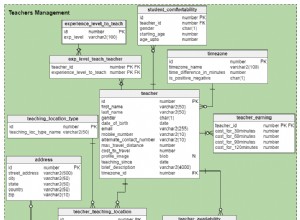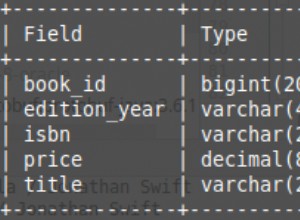SQLite में, json_tree() एक तालिका-मूल्यवान फ़ंक्शन है जो अपने पहले तर्क के रूप में प्रदान किए गए JSON मान पर चलता है और प्रत्येक सरणी तत्व या ऑब्जेक्ट सदस्य के लिए एक पंक्ति वाली तालिका देता है।
जब हम फ़ंक्शन को कॉल करते हैं तो हम JSON मान को तर्क के रूप में प्रदान करते हैं।
हम वैकल्पिक रूप से एक दूसरा तर्क पारित कर सकते हैं, जो शुरू करने के लिए एक पथ निर्दिष्ट करता है। जब हम ऐसा करते हैं, json_tree() उस पथ को शीर्ष-स्तरीय तत्व के रूप में मानता है।
json_tree() फ़ंक्शन शीर्ष-स्तरीय तत्व से शुरू होने वाले JSON सबस्ट्रक्चर के माध्यम से पुनरावर्ती रूप से चलता है। केवल शीर्ष-स्तरीय सरणी या ऑब्जेक्ट के तत्काल बच्चों को चलने के लिए, या केवल शीर्ष-स्तरीय तत्व ही यदि शीर्ष-स्तरीय तत्व एक आदिम मान है, तो json_each() का उपयोग करें इसके बजाय कार्य करें।
सिंटैक्स
हम json_tree() का उपयोग कर सकते हैं निम्नलिखित तरीकों से कार्य करें:
json_tree(X)
json_tree(X,P)जहां X JSON का प्रतिनिधित्व करता है, और P एक वैकल्पिक तर्क है जो शीर्ष-स्तर के रूप में व्यवहार करने के पथ का प्रतिनिधित्व करता है।
उदाहरण
यह कैसे काम करता है यह दिखाने के लिए यहां एक उदाहरण दिया गया है:
SELECT * FROM json_tree('{ "name" : "Woof", "age" : 10 }');परिणाम:
+------+--------------------------+---------+------+----+--------+---------+------+
| key | value | type | atom | id | parent | fullkey | path |
+------+--------------------------+---------+------+----+--------+---------+------+
| null | {"name":"Woof","age":10} | object | null | 0 | null | $ | $ |
| name | Woof | text | Woof | 2 | 0 | $.name | $ |
| age | 10 | integer | 10 | 4 | 0 | $.age | $ |
+------+--------------------------+---------+------+----+--------+---------+------+ हम देख सकते हैं कि प्रत्येक ऑब्जेक्ट सदस्य की कुछ उपयोगी जानकारी के साथ अपनी पंक्ति होती है, जैसे कि उसका प्रकार (एसक्यूएल टेक्स्ट वैल्यू), पथ इत्यादि।
id के बारे में कॉलम, SQLite दस्तावेज़ीकरण के अनुसार यह एक आंतरिक हाउसकीपिंग नंबर है, जिसकी गणना भविष्य के रिलीज में बदल सकती है। केवल गारंटी है कि id कॉलम हर पंक्ति के लिए अलग होगा।
सरणी
इस उदाहरण में, JSON मान एक सरणी है:
SELECT * FROM json_tree('[ 10, 30, 45 ]');परिणाम:
+------+------------+---------+------+----+--------+---------+------+ | key | value | type | atom | id | parent | fullkey | path | +------+------------+---------+------+----+--------+---------+------+ | null | [10,30,45] | array | null | 0 | null | $ | $ | | 0 | 10 | integer | 10 | 1 | 0 | $[0] | $ | | 1 | 30 | integer | 30 | 2 | 0 | $[1] | $ | | 2 | 45 | integer | 45 | 3 | 0 | $[2] | $ | +------+------------+---------+------+----+--------+---------+------+
पथ निर्दिष्ट करें
हम शीर्ष-स्तर के रूप में व्यवहार करने के लिए पथ निर्दिष्ट करने के लिए दूसरे तर्क का उपयोग कर सकते हैं।
उदाहरण:
SELECT * FROM json_tree('{ "a" : 1, "b" : [ 4, 7, 8 ] }', '$.b');परिणाम:
+-----+---------+---------+------+----+--------+---------+------+ | key | value | type | atom | id | parent | fullkey | path | +-----+---------+---------+------+----+--------+---------+------+ | b | [4,7,8] | array | null | 4 | null | $.b | $ | | 0 | 4 | integer | 4 | 5 | 4 | $.b[0] | $.b | | 1 | 7 | integer | 7 | 6 | 4 | $.b[1] | $.b | | 2 | 8 | integer | 8 | 7 | 4 | $.b[2] | $.b | +-----+---------+---------+------+----+--------+---------+------+
बड़ा दस्तावेज़
इस उदाहरण में हम एक बड़े JSON दस्तावेज़ का उपयोग करेंगे। सबसे पहले, json_tree() पर कॉल करें पथ निर्दिष्ट किए बिना:
SELECT * FROM json_tree('[
{
"user" : "Spike",
"age" : 30,
"scores" : [ 9, 7, 3 ]
},
{
"user" : "Faye",
"age" : 25,
"scores" : [ 90, 87, 93 ]
},
{
"user" : "Jet",
"age" : 40,
"scores" : [ 50, 38, 67 ]
}
]'
);परिणाम:
+--------+--------------------------------------------------------------+---------+-------+------+--------+----------------+-------------+
| key | value | type | atom | id | parent | fullkey | path |
+--------+--------------------------------------------------------------+---------+-------+------+--------+----------------+-------------+
| null | [{"user":"Spike","age":30,"scores":[9,7,3]},{"user":"Faye"," | array | null | 0 | null | $ | $ |
| null | age":25,"scores":[90,87,93]},{"user":"Jet","age":40,"scores | null | null | null | null | null | null |
| null | ":[50,38,67]}] | null | null | null | null | null | null |
+--------+--------------------------------------------------------------+---------+-------+------+--------+----------------+-------------+
| 0 | {"user":"Spike","age":30,"scores":[9,7,3]} | object | null | 1 | 0 | $[0] | $ |
+--------+--------------------------------------------------------------+---------+-------+------+--------+----------------+-------------+
| user | Spike | text | Spike | 3 | 1 | $[0].user | $[0] |
+--------+--------------------------------------------------------------+---------+-------+------+--------+----------------+-------------+
| age | 30 | integer | 30 | 5 | 1 | $[0].age | $[0] |
+--------+--------------------------------------------------------------+---------+-------+------+--------+----------------+-------------+
| scores | [9,7,3] | array | null | 7 | 1 | $[0].scores | $[0] |
+--------+--------------------------------------------------------------+---------+-------+------+--------+----------------+-------------+
| 0 | 9 | integer | 9 | 8 | 7 | $[0].scores[0] | $[0].scores |
+--------+--------------------------------------------------------------+---------+-------+------+--------+----------------+-------------+
| 1 | 7 | integer | 7 | 9 | 7 | $[0].scores[1] | $[0].scores |
+--------+--------------------------------------------------------------+---------+-------+------+--------+----------------+-------------+
| 2 | 3 | integer | 3 | 10 | 7 | $[0].scores[2] | $[0].scores |
+--------+--------------------------------------------------------------+---------+-------+------+--------+----------------+-------------+
| 1 | {"user":"Faye","age":25,"scores":[90,87,93]} | object | null | 11 | 0 | $[1] | $ |
+--------+--------------------------------------------------------------+---------+-------+------+--------+----------------+-------------+
| user | Faye | text | Faye | 13 | 11 | $[1].user | $[1] |
+--------+--------------------------------------------------------------+---------+-------+------+--------+----------------+-------------+
| age | 25 | integer | 25 | 15 | 11 | $[1].age | $[1] |
+--------+--------------------------------------------------------------+---------+-------+------+--------+----------------+-------------+
| scores | [90,87,93] | array | null | 17 | 11 | $[1].scores | $[1] |
+--------+--------------------------------------------------------------+---------+-------+------+--------+----------------+-------------+
| 0 | 90 | integer | 90 | 18 | 17 | $[1].scores[0] | $[1].scores |
+--------+--------------------------------------------------------------+---------+-------+------+--------+----------------+-------------+
| 1 | 87 | integer | 87 | 19 | 17 | $[1].scores[1] | $[1].scores |
+--------+--------------------------------------------------------------+---------+-------+------+--------+----------------+-------------+
| 2 | 93 | integer | 93 | 20 | 17 | $[1].scores[2] | $[1].scores |
+--------+--------------------------------------------------------------+---------+-------+------+--------+----------------+-------------+
| 2 | {"user":"Jet","age":40,"scores":[50,38,67]} | object | null | 21 | 0 | $[2] | $ |
+--------+--------------------------------------------------------------+---------+-------+------+--------+----------------+-------------+
| user | Jet | text | Jet | 23 | 21 | $[2].user | $[2] |
+--------+--------------------------------------------------------------+---------+-------+------+--------+----------------+-------------+
| age | 40 | integer | 40 | 25 | 21 | $[2].age | $[2] |
+--------+--------------------------------------------------------------+---------+-------+------+--------+----------------+-------------+
| scores | [50,38,67] | array | null | 27 | 21 | $[2].scores | $[2] |
+--------+--------------------------------------------------------------+---------+-------+------+--------+----------------+-------------+
| 0 | 50 | integer | 50 | 28 | 27 | $[2].scores[0] | $[2].scores |
+--------+--------------------------------------------------------------+---------+-------+------+--------+----------------+-------------+
| 1 | 38 | integer | 38 | 29 | 27 | $[2].scores[1] | $[2].scores |
+--------+--------------------------------------------------------------+---------+-------+------+--------+----------------+-------------+
| 2 | 67 | integer | 67 | 30 | 27 | $[2].scores[2] | $[2].scores |
+--------+--------------------------------------------------------------+---------+-------+------+--------+----------------+-------------+ इस मामले में, हमारा JSON मान एक सरणी है जिसमें तीन ऑब्जेक्ट होते हैं। प्रत्येक वस्तु को परिणामों में सूचीबद्ध किया जाता है, और उन वस्तुओं के सदस्यों में से प्रत्येक को उनके संबंधित मूल्यों के साथ सूचीबद्ध किया जाता है, और इसी तरह।
अब, json_tree() पर कॉल करते हैं फिर से, लेकिन इस बार हम एक पथ निर्दिष्ट करेंगे:
SELECT * FROM json_tree('[
{
"user" : "Spike",
"age" : 30,
"scores" : [ 9, 7, 3 ]
},
{
"user" : "Faye",
"age" : 25,
"scores" : [ 90, 87, 93 ]
},
{
"user" : "Jet",
"age" : 40,
"scores" : [ 50, 38, 67 ]
}
]',
'$[1]'
);परिणाम:
+--------+----------------------------------------------+---------+------+----+--------+----------------+-------------+
| key | value | type | atom | id | parent | fullkey | path |
+--------+----------------------------------------------+---------+------+----+--------+----------------+-------------+
| null | {"user":"Faye","age":25,"scores":[90,87,93]} | object | null | 11 | null | $[0] | $ |
| user | Faye | text | Faye | 13 | 11 | $[0].user | $[0] |
| age | 25 | integer | 25 | 15 | 11 | $[0].age | $[0] |
| scores | [90,87,93] | array | null | 17 | 11 | $[0].scores | $[0] |
| 0 | 90 | integer | 90 | 18 | 17 | $[0].scores[0] | $[0].scores |
| 1 | 87 | integer | 87 | 19 | 17 | $[0].scores[1] | $[0].scores |
| 2 | 93 | integer | 93 | 20 | 17 | $[0].scores[2] | $[0].scores |
+--------+----------------------------------------------+---------+------+----+--------+----------------+-------------+
इस मामले में मैंने [1] . निर्दिष्ट करके दूसरा सरणी तत्व चुना है (सरणी SQLite में शून्य आधारित हैं)।
नतीजा यह है कि पेड़ केवल दूसरे सरणी तत्व तक ही सीमित है।
आइए गहराई में जाएं:
SELECT * FROM json_tree('[
{
"user" : "Spike",
"age" : 30,
"scores" : [ 9, 7, 3 ]
},
{
"user" : "Faye",
"age" : 25,
"scores" : [ 90, 87, 93 ]
},
{
"user" : "Jet",
"age" : 40,
"scores" : [ 50, 38, 67 ]
}
]',
'$[1].scores'
);परिणाम:
+--------+------------+---------+------+----+--------+----------------+-------------+ | key | value | type | atom | id | parent | fullkey | path | +--------+------------+---------+------+----+--------+----------------+-------------+ | scores | [90,87,93] | array | null | 17 | null | $[0].scores | $[0] | | 0 | 90 | integer | 90 | 18 | 17 | $[0].scores[0] | $[0].scores | | 1 | 87 | integer | 87 | 19 | 17 | $[0].scores[1] | $[0].scores | | 2 | 93 | integer | 93 | 20 | 17 | $[0].scores[2] | $[0].scores | +--------+------------+---------+------+----+--------+----------------+-------------+
हम जितने गहरे जाते हैं, उतनी ही कम पंक्तियाँ वापस आती हैं। ऐसा इसलिए है क्योंकि हमें केवल एक पेड़ मिल रहा है जो हमारे द्वारा निर्दिष्ट विशिष्ट पथ से शुरू होता है।
क्वेरी को फ़िल्टर करना
हम दिए गए मानदंड के आधार पर परिणामों को फ़िल्टर करने के लिए अपनी क्वेरी को संशोधित कर सकते हैं। उदाहरण के लिए:
SELECT
fullkey,
value
FROM json_tree('[
{
"user" : "Spike",
"age" : 30,
"scores" : [ 9, 7, 3 ]
},
{
"user" : "Faye",
"age" : 25,
"scores" : [ 90, 87, 93 ]
},
{
"user" : "Jet",
"age" : 40,
"scores" : [ 50, 38, 67 ]
}
]'
)
WHERE json_tree.value LIKE '%Faye%';परिणाम:
+-----------+--------------------------------------------------------------+
| fullkey | value |
+-----------+--------------------------------------------------------------+
| $ | [{"user":"Spike","age":30,"scores":[9,7,3]},{"user":"Faye"," |
| null | age":25,"scores":[90,87,93]},{"user":"Jet","age":40,"scores |
| null | ":[50,38,67]}] |
+-----------+--------------------------------------------------------------+
| $[1] | {"user":"Faye","age":25,"scores":[90,87,93]} |
+-----------+--------------------------------------------------------------+
| $[1].user | Faye |
+-----------+--------------------------------------------------------------+ हम ऐसा करके केवल अंतिम पंक्ति वापस कर सकते हैं:
SELECT *
FROM json_tree('[
{
"user" : "Spike",
"age" : 30,
"scores" : [ 9, 7, 3 ]
},
{
"user" : "Faye",
"age" : 25,
"scores" : [ 90, 87, 93 ]
},
{
"user" : "Jet",
"age" : 40,
"scores" : [ 50, 38, 67 ]
}
]'
)
WHERE json_tree.value = 'Faye';परिणाम:
+------+-------+------+------+----+--------+-----------+------+ | key | value | type | atom | id | parent | fullkey | path | +------+-------+------+------+----+--------+-----------+------+ | user | Faye | text | Faye | 13 | 11 | $[1].user | $[1] | +------+-------+------+------+----+--------+-----------+------+
रिटर्न लीफ नोड्स
यदि हम चाहें तो परिणामों को केवल लीफ नोड्स तक सीमित कर सकते हैं। "लीफ नोड्स" से मेरा मतलब केवल उन चाबियों से है जिनमें आगे कोई चाइल्ड एलिमेंट नहीं है।
ऐसा करने के कुछ तरीके हैं।
एक विकल्प सभी वस्तुओं और सरणियों को फ़िल्टर करना है:
SELECT *
FROM json_tree('[
{
"user" : "Spike",
"age" : 30,
"scores" : [ 9, 7, 3 ]
},
{
"user" : "Faye",
"age" : 25,
"scores" : [ 90, 87, 93 ]
},
{
"user" : "Jet",
"age" : 40,
"scores" : [ 50, 38, 67 ]
}
]'
)
WHERE json_tree.type NOT IN ('object','array');परिणाम:
+------+-------+---------+-------+----+--------+----------------+-------------+ | key | value | type | atom | id | parent | fullkey | path | +------+-------+---------+-------+----+--------+----------------+-------------+ | user | Spike | text | Spike | 3 | 1 | $[0].user | $[0] | | age | 30 | integer | 30 | 5 | 1 | $[0].age | $[0] | | 0 | 9 | integer | 9 | 8 | 7 | $[0].scores[0] | $[0].scores | | 1 | 7 | integer | 7 | 9 | 7 | $[0].scores[1] | $[0].scores | | 2 | 3 | integer | 3 | 10 | 7 | $[0].scores[2] | $[0].scores | | user | Faye | text | Faye | 13 | 11 | $[1].user | $[1] | | age | 25 | integer | 25 | 15 | 11 | $[1].age | $[1] | | 0 | 90 | integer | 90 | 18 | 17 | $[1].scores[0] | $[1].scores | | 1 | 87 | integer | 87 | 19 | 17 | $[1].scores[1] | $[1].scores | | 2 | 93 | integer | 93 | 20 | 17 | $[1].scores[2] | $[1].scores | | user | Jet | text | Jet | 23 | 21 | $[2].user | $[2] | | age | 40 | integer | 40 | 25 | 21 | $[2].age | $[2] | | 0 | 50 | integer | 50 | 28 | 27 | $[2].scores[0] | $[2].scores | | 1 | 38 | integer | 38 | 29 | 27 | $[2].scores[1] | $[2].scores | | 2 | 67 | integer | 67 | 30 | 27 | $[2].scores[2] | $[2].scores | +------+-------+---------+-------+----+--------+----------------+-------------+
इसे करने का दूसरा तरीका atom . की जांच करना है शून्य मानों के लिए कॉलम। विशेष रूप से, हम केवल उन पंक्तियों को वापस करेंगे जहां यह कॉलम doesn't है शून्य मान शामिल करें:
SELECT *
FROM json_tree('[
{
"user" : "Spike",
"age" : 30,
"scores" : [ 9, 7, 3 ]
},
{
"user" : "Faye",
"age" : 25,
"scores" : [ 90, 87, 93 ]
},
{
"user" : "Jet",
"age" : 40,
"scores" : [ 50, 38, 67 ]
}
]'
)
WHERE atom IS NOT NULL;परिणाम:
+------+-------+---------+-------+----+--------+----------------+-------------+ | key | value | type | atom | id | parent | fullkey | path | +------+-------+---------+-------+----+--------+----------------+-------------+ | user | Spike | text | Spike | 3 | 1 | $[0].user | $[0] | | age | 30 | integer | 30 | 5 | 1 | $[0].age | $[0] | | 0 | 9 | integer | 9 | 8 | 7 | $[0].scores[0] | $[0].scores | | 1 | 7 | integer | 7 | 9 | 7 | $[0].scores[1] | $[0].scores | | 2 | 3 | integer | 3 | 10 | 7 | $[0].scores[2] | $[0].scores | | user | Faye | text | Faye | 13 | 11 | $[1].user | $[1] | | age | 25 | integer | 25 | 15 | 11 | $[1].age | $[1] | | 0 | 90 | integer | 90 | 18 | 17 | $[1].scores[0] | $[1].scores | | 1 | 87 | integer | 87 | 19 | 17 | $[1].scores[1] | $[1].scores | | 2 | 93 | integer | 93 | 20 | 17 | $[1].scores[2] | $[1].scores | | user | Jet | text | Jet | 23 | 21 | $[2].user | $[2] | | age | 40 | integer | 40 | 25 | 21 | $[2].age | $[2] | | 0 | 50 | integer | 50 | 28 | 27 | $[2].scores[0] | $[2].scores | | 1 | 38 | integer | 38 | 29 | 27 | $[2].scores[1] | $[2].scores | | 2 | 67 | integer | 67 | 30 | 27 | $[2].scores[2] | $[2].scores | +------+-------+---------+-------+----+--------+----------------+-------------+
atom कॉलम आदिम तत्वों के अनुरूप SQL मान है - JSON सरणियों और वस्तुओं के अलावा अन्य तत्व। यह कॉलम हमेशा null होता है JSON सरणी या ऑब्जेक्ट के लिए। value कॉलम atom . जैसा ही है आदिम JSON तत्वों के लिए स्तंभ लेकिन सरणियों और वस्तुओं के लिए पाठ JSON मान लेता है।
एक डेटाबेस उदाहरण
मान लीजिए हमारे पास निम्न तालिका है:
SELECT * FROM scores;परिणाम:
+---------+---------------------------------------------------------+
| teacher | students |
+---------+---------------------------------------------------------+
| Zohan | [{"Amy":[10,8,9]},{"Josh":[3,2,4]},{"Igor":[7,6,5]}] |
| Stacy | [{"Pete":[5,3,1]},{"Liz":[5,8,7]},{"Jet":[9,5,7]}] |
| Aisha | [{"Zolton":[4,6,7]},{"Bree":[7,7,4]},{"Rohit":[9,8,8]}] |
+---------+---------------------------------------------------------+
इस टेबल को scores . कहा जाता है दो कॉलम हैं। पहले कॉलम में शिक्षक का नाम होता है, और दूसरे कॉलम में JSON दस्तावेज़ होता है। JSON दस्तावेज़ में छात्र और उनके स्कोर शामिल हैं।
यहां एक क्वेरी चलाने का एक उदाहरण दिया गया है जो json_tree() . का उपयोग करती है इस तालिका के विरुद्ध:
SELECT
teacher,
key AS student,
value
FROM
scores,
json_tree(students, '$[1].Liz')
WHERE json_tree.key = 'Liz';परिणाम:
+---------+---------+---------+ | teacher | student | value | +---------+---------+---------+ | Stacy | Liz | [5,8,7] | +---------+---------+---------+
यहां, हमने लिज़ के सभी स्कोर लौटा दिए, और हमने उसकी शिक्षिका को भी लौटा दिया।
निम्नलिखित क्वेरी उसका दूसरा स्कोर लौटाती है:
SELECT
teacher,
key AS student,
value AS score
FROM
scores,
json_tree(students, '$[1].Liz')
WHERE json_tree.key = 1;परिणाम:
+---------+---------+-------+ | teacher | student | score | +---------+---------+-------+ | Stacy | 1 | 8 | +---------+---------+-------+




